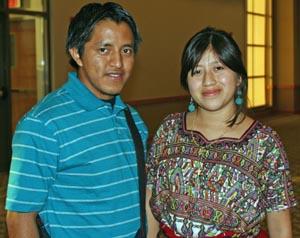
By Barb Arland-Fye
What a privilege to meet two young Guatemalans studying at a community college in the Davenport Diocese so they can serve as leaders and role models in their homeland!
Francisco “Fernando” Guarchaj, 21, and Catarina Deleon, 19, didn’t know each other before arriving in the United States during the summer of 2010 to study at Scott Community College in Bettendorf. They come from different Guatemalan communities and speak different indigenous languages, but share a desire to better their own lives and those of their people.
Each student received a scholarship through Scholarships for Education and Economic Development (SEED Program), which provides educational opportunities for individuals ages 18-24 with limited economic resources but tremendous ability, said Susan Hess, SEED Program coordinator for Scott Community College.
Altogether, 19 students from seven participating countries (Dominican Republic, El Salvador, Guatemala, Haiti, Honduras, Mexico and Nicaragua) received scholarships for a two-year course of study that began in August 2010 at Scott Community College. Georgetown University administers the contract for the SEED Program, funded by U.S.A.I.D.
Despite busy schedules that include community service obligations, Fernando and Catarina accepted the opportunity to visit Sept. 30 with a well-known bishop from their country: Bishop Alvaro Leonel Ramazzini. He traveled to Davenport to receive this year’s Pacem in Terris Peace and Freedom Award on Oct. 2.
Francisco and Catarina, both Catholics, knew of the bishop through his reputation as a champion for human rights in their country even though they do not live in his Diocese of San Marcos. In an animated conversation in Spanish with the bishop, which he clearly enjoyed, the two students explained what they hope to accomplish here and back home.
“The goal is to help them develop leadership skills and to be positive agents for change,” Susan explained.
Fernando and Catarina didn’t know English when they arrived here, but picked up the language quickly through English as a Second Language classes, a year with their host families and immersion in the American culture. Now they’re trilingual — speaking an indigenous language (K’iche’ for Fernando and Ixil for Catarina), Spanish and English.
As part of their studies, each works on a major project designed to benefit their home communities.
Fernando’s project would provide work for young women ages 12-20 creating backpacks with designs reflecting their culture for export to other countries. “It would give them an opportunity to have money for school,” he said.
Catarina’s project would help expectant mothers make nutritious food choices for the sake of their unborn children as well as after the children are born. Malnourishment is a significant problem in Guatemala. Bishop Ramazzini says 59 percent of indigenous children ages 1-5 years old are malnourished.
“I see them as my children who are malnourished there. I want to help my community,” Catarina said.
More than 200 students from 15 countries have been trained through the SEED Program alongside U.S. students since 1985. What a blessing for all of us.








